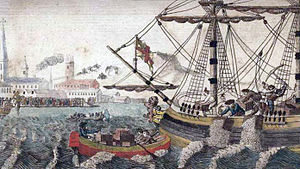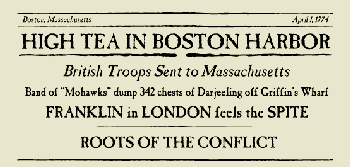What inspired the Sons of Liberty to throw 342 chests of tea overboard today in 1773?
 April 27, 1773 — British Parliament passed the Tea Act today.
April 27, 1773 — British Parliament passed the Tea Act today.
The bill — designed to save the faltering East India Company from bankruptcy by greatly lowering the tea tax it paid to the British government — granted it a de facto monopoly on the American tea trade. All legal tea entered the colonies through England, allowing the East India Company to pay lower taxes in Britain and to sell tea more cheaply in the colonies. Even untaxed Dutch tea, which entered the colonies illegally through smuggling, was more expensive the East India tea, after the act took effect.
British Prime Minister, Frederick, Lord North, who initiated the legislation, thought it impossible that the colonists would protest cheap tea; he was wrong. Not only did many of the settlers rightly realize the act was just a reprise of the hated Townshend duties, but the establishment of special channels of distributions and sales left many shopkeepers cut out of the deal infuriated.
Less than 8 months later — on the night of December 16, 1773 — Samuel Adams and the Sons of Liberty boarded three ships in the Boston harbor and threw 342 chests of tea overboard. This resulted in the passage of the punitive Coercive Acts in 1774 and pushed the two sides closer to war.
Sources
Words of Wisdom
Last Night 3 Cargoes of Bohea Tea were emptied into the Sea. This Morning a Man of War sails. This is the most magnificent Movement of all. There is a Dignity, a Majesty, a Sublimity, in this last Effort of the Patriots, that I greatly admire. The People should never rise, without doing something to be remembered—something notable And striking. This Destruction of the Tea is so bold, so daring, so firm, intrepid and inflexible, and it must have so important Consequences, and so lasting, that I cant but consider it as an Epocha in History. There was a repeat performance on March 7, 1774, but it was much less destructive.





